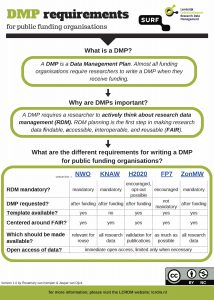Data Management Plan Requirements of Public Funding Agencies
Practically all scientific funding agencies have Data Management Plan (DPM) requirements. In a DMP, you explain what data you are going to collect and how you plan to store it during the research and (if possible) make it available afterwards. Writing a DMP can be time-consuming, depending on the complexity of the project. If you are considering different funders to submit your proposal to, you may wonder if their DMP requirements differ. To find out, The Working Group Engagement of the National Coordination Point for Research Data Management compared the DMP requirements of five funding agencies (Horizon2020 (EU), NWO, KNAW, FP7Framework (EU) and ZonMw), and created a matrix of their differences and similarities (see figure below). In short: their requirements do not differ very much.
Consensus on the Data Management Plan content: a focus on FAIR
First, there is a general consensus of what a DMP should describe:
- Which data will be collected, processed and/or generated
- The stakeholders and roles in the data collection, processing etc. during the project
- The handling of the data during the project and the long-term archiving solutions envisaged
- Sharing, ownership and privacy aspects
As you can see, these aspects focus on keeping the data safe during the project and possibly on publishing the data afterwards. This second aspect of availability reflects funders’ interest in data being FAIR: Findable, Accessible, Interoperable and Reusable.
Most DMP templates focus on how you plan to achieve FAIRness. Funders wish to see that you will safely keep the data during research and that you archive them in the long term – and share them publicly, if issues such as privacy do not stand in the way.
Wageningen University & Research also offers a DMP template for PhD students and chair groups. This template also includes the bullet points above.
Differences and similarities
DMP requirements
Only with three out of five funding agencies, writing a DMP is mandatory. FP7 is the least demanding (although this funding programme is now closed). For all agencies, DMPs have to be written only after funding of the project has been awarded. It is thus a myth that the DMP itself is a pre-requisite for funding. In most cases, only a brief data management section in the proposal is required.
DMP template content
Four out of five funders supply researchers with a template for the DMP. As explained above, the elements in the templates are comparable to the template provided by Data Management Support of Wageningen University and Research, steering the researcher towards FAIR Data Management.
Where to keep data in the long term
All funders prescribe where data should be archived generally (trusted data archive, accepted standards, sustainable), but allow room for discipline-specific solutions. All funders require metadata that describe the origin and content of the stored dataset.
Making data publicly available
FAIR data is a requirement with all funders; which is in line with the National Plan Open Science. The five funders that were examined even go one step further and request immediate open access. However, all five also allow for ‘limited access’ when necessary. The operating principles behind this limited access are: issues of privacy, commercial interest, public safety and intellectual property rights.
In terms of what data to share, KNAW and ZonMw require that all data are made available. NWO and EU require only those data that are required for validation of and/or that are relevant for reuse to be made available.
How can we help?
This blog has hopefully given you some idea of different funders’ DMP requirements and templates. It appears that these differ only slightly, and that they share a common interest in the notion of FAIR. Keeping this idea of FAIR in mind should also help you in answering some of the questions in the DMP template. Would you like more information or individual support? Data Management Support can assist you with questions on funder requirements on Data Management Planning, data storage solutions and data archiving. We can advise you on how to write the data management section in initial proposals, as well as with the more detailed DMP to be written after funding has been granted. We also provide a course on Research Data Management for PhD students a few times a year.
Keeping the idea of FAIR in mind should help you in answering the questions in a DMP.
Thanks to my colleague Hilde for reviewing and uplifting this blog


